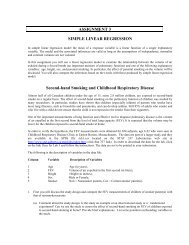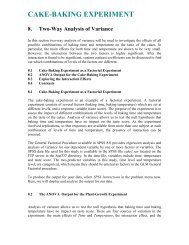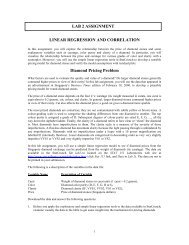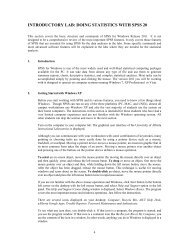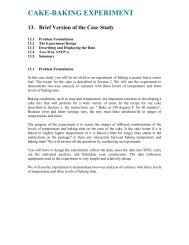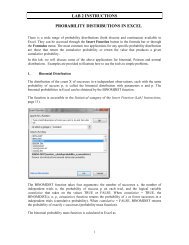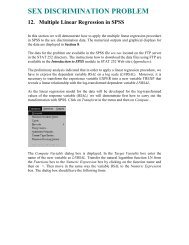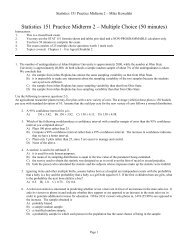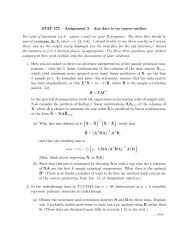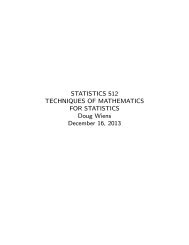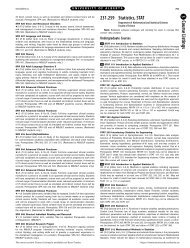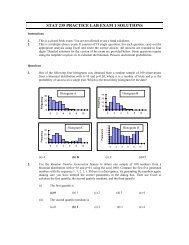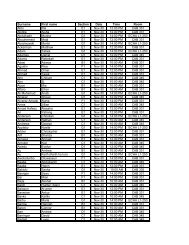- Page 1 and 2:
STATISTICS 665 ASYMPTOTIC METHODS I
- Page 3 and 4:
II LARGE-SAMPLE INFERENCE 42 5 Intr
- Page 5 and 6:
V LIKELIHOOD METHODS 169 19 Maximum
- Page 7 and 8:
Part I PROBABILISTIC PRELIMINARIES
- Page 9 and 10:
The ‘rate’ of convergence refer
- Page 11 and 12:
11 imagine ‘large’ but remain
- Page 13 and 14:
13 • For the ( ) distribution,
- Page 15 and 16:
15 —Corollary1: → If h (
- Page 17 and 18:
17 2. Slutsky’s Theorem; conseque
- Page 19 and 20:
— By the CLT, − q (1 − ) 1
- Page 21 and 22:
21 • Corollary 1: If → the
- Page 23 and 24:
23 • First an application. Let 2
- Page 25 and 26:
25 with d.f. (), then there is a
- Page 27 and 28:
27 next lecture), = 1− " ( )+
- Page 29 and 30:
29 • CLT via the Edgeworth expans
- Page 31 and 32:
31 (why?) with ‘cumulant generati
- Page 33 and 34:
Thus in (3.2), () () isthec.f.of
- Page 35 and 36:
35 • Delta method. Suppose that
- Page 37 and 38:
37 • Uniformity—read§2.6 • C
- Page 39 and 40:
39 suppose that → 0. Then X =1
- Page 41 and 42:
41 • Under this condition ˆ is (
- Page 43 and 44:
43 5. Introduction to asymptotic te
- Page 45 and 46:
45 • We often work instead with t
- Page 47 and 48:
47 • Two-sample problems. Suppose
- Page 49 and 50:
49 • Example 2: 1 ∼ P(),
- Page 51 and 52:
51 term is à √ ˆ ( ( 0 )
- Page 53 and 54:
53 • More useful is to study the
- Page 55 and 56:
55 • Example: t-test of a mean.
- Page 57 and 58:
57 • Efficacy. Test : = 0 vs.
- Page 59 and 60:
59 Put = − and test for tre
- Page 61 and 62:
61 7. Relative efficiency • Relat
- Page 63 and 64:
• The constraint (1) ∼ (2)
- Page 65 and 66:
65 =1. Theefficacy is = 0 q (0)
- Page 67 and 68:
67 • Example 3. In this example
- Page 69 and 70:
69 Proof of ‘ 1’: From 1 − (
- Page 71 and 72: 71 • We will consider only ‘lev
- Page 73 and 74: 73 • Example 1. Suppose we (mista
- Page 75 and 76: 75 To see this take 0 = 0 for simp
- Page 77 and 78: 77 The numerator of is normally d
- Page 79 and 80: 79 9. Confidence intervals • X =(
- Page 81 and 82: 81 • Example. 1 ∼ () ( 0);
- Page 83 and 84: 83 • A strong CI on a population
- Page 85 and 86: 85 • A more involved example of a
- Page 87 and 88: 87 We exhibit 1 () 2 () → 1−
- Page 89 and 90: 10. Point estimation; Asymptotic re
- Page 91 and 92: 91 Recall that if 0 () 6= 0 (assum
- Page 93 and 94: 93 where (with being a bound on |
- Page 95 and 96: • Asymptotic Relative Efficiency.
- Page 97 and 98: 97 0.0 0.1 0.2 0.3 0.4 0.5 0.6 -3 -
- Page 99 and 100: 99 that then √ ³ ¯ − ´
- Page 101 and 102: 101 — This is also the ARE of the
- Page 103 and 104: 103 We minimize Z h 2 ()+2 2 ()
- Page 105 and 106: 105 In a broad class of cases, comp
- Page 107 and 108: 107 The ARE of the estimates consid
- Page 109 and 110: 109 We have lim →∞ { ∗ () −
- Page 111 and 112: 111 13. Random vectors; multivariat
- Page 113 and 114: 113 • X () () → c (constant)
- Page 115 and 116: 115 • Multivariate normality. We
- Page 117 and 118: 117 • If X ∼ (μ Σ) then an
- Page 119 and 120: 119 14. Multivariate applications
- Page 121: 121 One can eliminate the last elem
- Page 125 and 126: 125 at = 1. In this latter case Ã
- Page 127 and 128: 127 Proof: Write Then +1 = − X
- Page 129 and 130: 129 15. Expectation functionals; U-
- Page 131 and 132: 131 • A closely related estimate,
- Page 133 and 134: 1≤≤ 133 — e.g. = 2; let =
- Page 135 and 136: 135 • Rao-Blackwell Theorem: We c
- Page 137 and 138: 137 • Here we get the variance of
- Page 139 and 140: 139 16. Asymptotic normality of U-s
- Page 141 and 142: 141 Under , ( + ) = () ∼ (0 1)
- Page 143 and 144: 143 • Proofofclaim1: [( − ) |
- Page 145 and 146: 145 • V-statistics. Recall that i
- Page 147 and 148: 147 17. Influence function analysis
- Page 149 and 150: 149 By using the fact that | 2 −
- Page 151 and 152: 151 — e.g. If ( )= [], then ³
- Page 153 and 154: 153 By the CLT and Slutsky’s theo
- Page 155 and 156: But −1 X =1 155 ( ≥ ) =
- Page 157 and 158: 157 18. Bootstrapping • Suppose t
- Page 159 and 160: 159 • In each of the examples abo
- Page 161 and 162: 161 • Example 2. ( )=bias. Writ
- Page 163 and 164: 163 • For the measure (18.1) we t
- Page 165 and 166: 165 (True for functionals (·) con
- Page 167 and 168: 167 • Indeed, since ( ) has plu
- Page 169 and 170: 169 Part V LIKELIHOOD METHODS
- Page 171 and 172: 171 By this, for large samples and
- Page 173 and 174:
173 • Assume: (C1) Identifiabilit
- Page 175 and 176:
175 • Under stronger conditions o
- Page 177 and 178:
177 Then (here we use only twice; t
- Page 179 and 180:
179 • Information Inequality. (Cr
- Page 181 and 182:
181 • Example: 1 the indicator
- Page 183 and 184:
183 Theorem: Under (C1)-(C7) and th
- Page 185 and 186:
185 has a limit distribution, so th
- Page 187 and 188:
187 Claim: (i) (ii) (iii) 0 ( 0 )
- Page 189 and 190:
189 Define the ‘scores’ ( −
- Page 191 and 192:
191 • The MLE is not the only eff
- Page 193 and 194:
193 The variance-minimizing choice
- Page 195 and 196:
195 • Multiparameter likelihood e
- Page 197 and 198:
197 • Efficiency. Under appropria
- Page 199 and 200:
199 asymptotic normality of the sam
- Page 201 and 202:
201 • Likelihood ratio test. Put
- Page 203 and 204:
203 and 000 ( ∗∗ ) is (1)
- Page 205 and 206:
205 • Example. 1 ∼ Logistic,
- Page 207 and 208:
207 • Multiparameter inferences.
- Page 209 and 210:
209 For testing, I( 0 ) is replaced
- Page 211 and 212:
211 24. Examples Example: 1 ∼
- Page 213 and 214:
213 with and I (θ 0 )= 1 I 11 (θ
- Page 215 and 216:
215 • The likelihood ratio statis
- Page 217 and 218:
217 • If instead of testing =
- Page 219 and 220:
219 The parameter vector is θ = ³
- Page 221 and 222:
221 25. Higher order asymptotics
- Page 223 and 224:
223 As in Lecture 10, cov h i 2 h
- Page 225 and 226:
225 • The normal approximation, a
- Page 227 and 228:
227 By uniqueness of m.g.f.s, (;
- Page 229 and 230:
229 • Example 2. Let = P 1 w
- Page 231:
231 • The error of Saddlepoint



